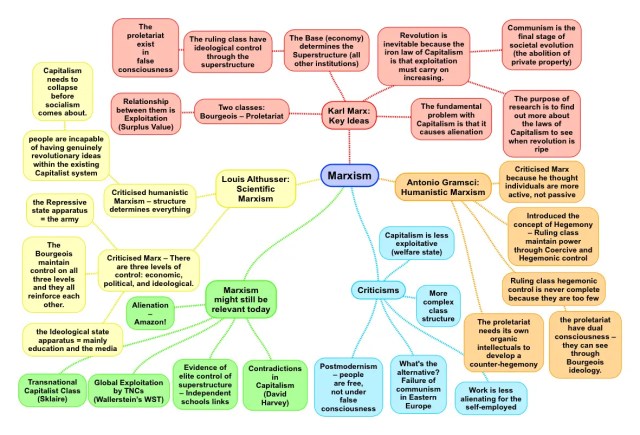Karl Marx and Louis Althusser are Modernist, Structural Conflict Theorists while Antonio Gramsci is a Humanist Conflict Theorist.

Karl Marx: Key Ideas
- Two classes – Bourgeois – Proletariat
- Relationship between them is Exploitation/ Surplus Value
- The Base (economy) determines the Superstructure (all other institutions)
- The ruling class have ideological control through the superstructure
- The proletariat exist in false consciousness
- The fundamental problem with Capitalism is that it causes alienation
- Revolution is inevitable because the iron law of Capitalism is that exploitation must carry on increasing.
- Communism is the final stage of societal evolution (the abolition of private property)
- The purpose of research is to find out more about the laws of Capitalism to see when revolution is ripe.
Antonio Gramsci: Humanistic Marxism
- Criticised Marx because he thought individuals are more active, not passive
- Introduced the concept of Hegemony – Ruling class maintain power through Coercive and Hegemonic control
- Ruling class hegemonic control is never complete because they are too few and they have the proletariat have dual consciousness – they can see through Bourgeois ideology.
- To bring about social change the proletariat needs its own organic intellectuals to develop a counter-hegemony – a realistic alternative to Communism, to lead people to Socialism.
Louis Althusser: Scientific Marxism
- Criticised Marx – There are three levels of control: economic, political, and ideological. The Bourgeois maintain control on all three levels and they all reinforce each other.
- They maintain control through the Repressive state apparatus – the army
- More importantly – the Ideological state apparatus – everything else, most obviously education and the media.
- Criticised humanistic Marxism – structure determines everything, people are incapable of having genuinely revolutionary ideas within the existing Capitalist system
- Capitalism needs to collapse before socialism comes about.
Overall Evaluations of Marxism
Eight ways in which Marxism might still be relevant today
- Transnational Capitalist Class (Sklaire)
- Global Exploitation by TNCs (Wallerstein’s WST)
- Evidence of elite control of superstructure – Independent schools links
- Ideological Control – Agenda Setting and Jeremy Corbyn
- Advertising and False Needs
- Alienation – Amazon!
- Contradictions in Capitalism – David Harvey
- Marxism Conference – Organic Intellectuals?
Criticisms of Marxism
- X – More complex class structure
- X – Capitalism is less exploitative (welfare state)
- X – Relative autonomy
- X – Postmodernism – people are free, not under false consciousness
- X – Work is less alienating for self-employed people
- X – Scientific Marxism is economically deterministic (Interactionism)
- X – Failure of communism in Eastern Europe
- X – It is a metanarrative (Postmodernism)